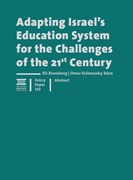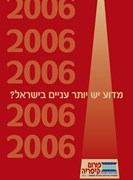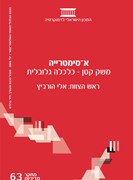

Publications Regarding Socioeconomic gaps
Articles

The Left Behind: Intergenerational Mobility and the Poverty Trap in Israel | Executive Summary
Written By: Zak Hirsch, Prof. Yotam Margalit, Prof. Karnit Flug
This study was published ahead of the Eli Hurvitz Conference on Economy and Society 2025.

Cuts to the National Authority for Community Safety Harm National Security
Written By: Dr. Yael Litmanovitz, Tomer Lotan
Drastic budget cuts to Israel's National Authority for Community Safety jeopardize national security by eliminating essential violence prevention and community support services, disproportionately impacting vulnerable populations and exacerbating social instability.

Early Childhood Daycare Subsidies in Israel in Different Sectors
Written By: Gabriel Gordon,
A survey of daycare subsidies in Israel and recommendations for improved criteria that would encourage participation in the labor market among the ultra-Orthodox.

The Link Between Education, Mobility, and High Tech - Eli Hurvitz Conference Day 2
“I want to maintain a strong, independent system of higher education” Yoav Kish, Minister of Education

High-Tech as a Path to Intergenerational Mobility
Written By: Zak Hirsch, Prof. Yotam Margalit, Yechiel Noam, Prof. Karnit Flug
Study on the integration and mobility of individuals from disadvantaged economic backgrounds in the high-tech industry
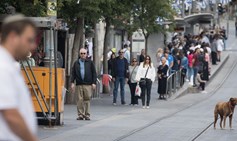
Public Opinion Survey on Socioeconomic Issues
Written By: Prof. Karnit Flug, Dana Bublil, Yarden Kedar, Roe Kenneth Portal
Despite the health and economic crisis that has affected Israel since March 2020, the share of those who say they are satisfied with their economic situation (“somewhat satisfied” or “very satisfied”) has risen from 28% in the summer of 2019 to around 33% in May 2022.

Intergenerational Mobility in Israel is Relatively Low
Written By: Prof. Karnit Flug, Gabriel Gordon, Roe Kenneth Portal
New IDI study finds that only 14% of Israeli children in the bottom income quartile will reach the top quartile
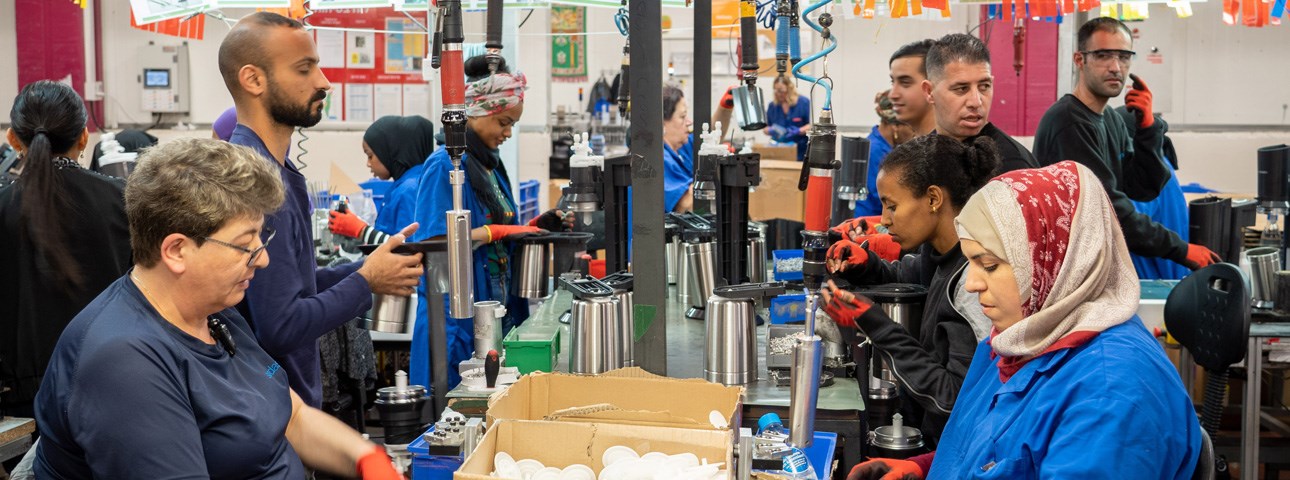
Intergenerational Mobility in Israel: Do Gaps Get Smaller from Generation to Generation?
Written By: Gabriel Gordon, Prof. Karnit Flug, Roe Kenneth Portal
This study examines patterns of intergenerational mobility and found considerable differences between different population groups

Human Capital in Israel
Developing human capital in Israel is the key to narrowing the labor productivity gap as a key to reducing income disparities

Israel Climbs Five Spots in the World Bank’s Ease of Doing Business Index
Israel improved by five spots over last year in the index of 190 countries. In first place is New Zealand, followed by Singapore, Denmark, Hong Kong, and South Korea. The Ease of Doing Business Index is an international indicator of how easy it is to do business in various countries.

The High Price of Ignoring Poverty
Written By: Dr. Sami Miaari
Following the publication of the Poverty Report, Dr. Sami Miaari points out the large percentage of Arab Israelis that live in poverty. He says the current situation requires a new strategy and economic investment on several levels simultaneously. This article first appeared on Times of Israel.

Shemitat Kesafim: The Year of Escape from Debt
Written By: Prof. Benjamin Porat
Dr. Benny Porat discusses the precept of debt cancellation during the sabbatical year (Shemita) and proposes ways in which to update this practice to suit the economics of contemporary Israel and create a model society.

Shmita: Rest, Share, Release
Written By: Prof. Yedidia Z. Stern
An exploration of the existential, social, and economic dimensions of the Shmita year, that calls for bringing together social, moral, cultural, religious and national forces to implement the idea of Shmita in non-agricultural and national contexts in Israel.

May 2014 Peace Index
This month's Peace Index poll covers US-Israel relations, theoretical unilateral moves by the Israeli government, attitudes towards and pursuit of "price tag" perpetrators, and Israeli defense and socioeconomic challenges.

April 2014 Peace Index
Two-Thirds of Israeli Jews Agree with Israeli Gov’t Decision to Halt Negotiations Following Hamas Reconciliation
Majority of Israeli Jews Disagree with US President Obama Blaming Both Sides for Lack of Progress in Talks

The Israeli Economy: Has the Melting Pot Succeeded?
Written By: Momi Dahan
A study conducted by IDI Senior Fellow Prof. Momi Dahan that reveals that there has been a continuous narrowing of income gaps between Israelis of European-American origins and of Asian-African origins since the 1990s.
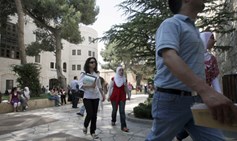
Is Anyone Surprised that Only 11% of Israeli Undergraduate Students are Arab?
Written By: Nabil Khattab
As the academic year started at Israeli universities, <em>Haaretz </em>reported that Israel's Arab population is extremely under-represented in all levels of Israeli higher education. Dr. Nabil Khattab, head of IDI's Arab-Jewish Relations project, shares his thoughts on these findings.
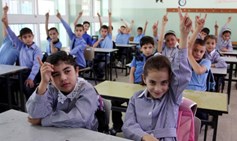
Analysis of Scholastic Achievement Disparities between the Arab and Jewish Sectors: The PISA Tests, 2000 to 2009
Written By: Leah Borovoi, Avital Manor, Nabil Khattab
Research conducted by IDI's Arab-Jewish Relations project reveals a disparity between student achievement in the Jewish and Arab sectors. This abstract points to the variables that explain these disparities.

Do Educational Gaps between Elementary School Teachers Have an Impact on Achievement Gaps between Jewish and Arab Schools?
Written By: Nabil Khattab
Are there gaps in the level of formal education required of elementary school teachers in the Arab and Jewish sectors in Israel and the level of education that they actually attain? Dr. Nabil Khattab, head of IDI’s Arab-Jewish Relations project, explores this question as part of an attempt to understand gaps in achievement between Jewish and Arab schools.

State Involvement in Equitable Distribution: A Comparison of the Jewish and Arab Sectors in Israel
Written By: Amit Lazarus
An article on the role of the State in the redistribution of economic resources during the first decade of the 21st century, which was written as part of IDI’s Arab-Jewish Relations project.

Employment Among Israeli Arabs
The percentage of Arabs in the labor market is lower than that of other groups in Israeli society and is among the lowest in the world. Because this discrepancy is based on national-religious schisms, raising the Arab employment rate has important economic, social, and political-national implications. Find out more about this issue in this report, which was submitted by IDI's Arab-Jewish Forum to the Committee for Socio-Economic Change headed by Professor Manuel Trajtenberg.

A New Social-Economic Agenda for Israel
Written By: Momi Dahan
In an op-ed, originally published on the Ynet website, IDI Senior Fellow Dr. Momi Dahan reflects on the wave of social protest of the summer of 2011 and stresses that the response to the protest must be a new social-economic agenda.

How Hard Is It to Do Business in Israel?
Written By: Daphna Aviram-Nitzan, Prof. Yuval Feldman
"In order to change this trend, we must increase the use of technological tools and behavioral economics."

Time to Include Arabs among the Decision-Makers
Written By: Dr. Nasreen Haddad Haj-Yahya
The state and its Arab leadership, not only the political leadership, must work together to bring as many Arab citizens as possible into the decision-making echelons.



